Wednesday, August 30, 2006
wake up!
when did karaoke night become a national pastime?
i've often wondered where all of these tone-deaf megalomaniacs who show up for american idol auditions come from. don't they know what they sound like? it's almost too painful to watch. (almost.)
it's a great american myth, to tell anyone that if they can believe it, they can achieve it, no matter what it is. that's some horatio alger supposedly well-intentioned pull-yourself-up-by-your-own-bootstraps you-can-do-anything malarkey, the kind of thing old white people like to sit around and say when they talk about how they did it back in their day. what a big hot steaming crock of you know what! nobody goes it alone. anyone that accomplishes anything at all had plenty of help -- definitely from the government and certainly back in the day. sure, we'd all like to believe that this country is fair and equal and good to everyone and just brimming with opportunity, because that's what the brochure says. everyone gets paid the same rate for the same job. there's no institutionalized racism there's actually justice in the courts. but its not. what's in the brochure and what you get when you show up are usually two very different things.
i look at the video above and i just don't get it. why would anyone want to be a singer if they can't sing?
you're supposed to go where your talents lead you -- not your ego. if i were tone-deaf and great at math, i wouldn't be doing this. can a midget really play in the nba, if that's what he wants to do with his life? please. don't get me wrong, we all have our delusions. ella fitzgerald didn't want to sing. she wanted to be a dancer. as a matter of fact, when she showed up to perform for the apollo theater's infamous amateur night, she got scared, changed her mind at the last minute and decided to sing. and the rest, as they say, is history.
i don't know which disney moppet sang that song, a dream is a wish your heart makes in cinderella (probably the fairy godmother) -- but you know what? wishing doesn't make it so. if you want to make your dreams come true, the first thing you have to do is wake up.
Wednesday, August 23, 2006
this hurts, too
- use The Salary Calculator to find out how much you'd need to live in another city anywhere in the world.
- before you do that, you might want to check with The Salary Wizard to find out what your job is worth -- and if you're getting paid what you should. (then again, who is?)
- this might help: it's the IRS Withholding Calculator.
- the Rent vs. Buy Calculator tells you how much you want to spend every month and how much you'd have to put down on your house.
- i love this one. it's a Mortgage Qualification Calculator that estimates how much money lenders will expect you to earn, to get any money from them.
- use this Debt Consolidation Calculator to find out your debt to income ratio.
- this one is my favorite: a Debt Reduction Calculator. (you don't even want to know when this thing says i'll be debt free...)
- everyone knows how old they are chronologically but RealAge.com tells you how old you are physically. and yes. according to their calculations, i'm 26. (hey, don't blame me. blame my life of no debauchery.)
- here's a Dog Age Calculator and a Cat Age Calculator so you can find out how old "Buddy" and "Snowball" really are.
- ...and last but not least: i'm not sure about The Death Calculator but since it's all lifestyle related, it's pretty interesting to see what it says.
Sunday, August 20, 2006
this hurts
Saturday, August 19, 2006
here's an interesting tid-bit...
interesting, that the reviewer would draw the correlation between the big black women in musicals and the big black women in tv commercials.
i suppose that recognizing the problem is progress but the only real answer lies in us as individuals not sitting around anymore, waiting for the phone to ring -- nurturing and developing our ideas, forging ahead independently and creating our own work. that's a tall order. but when i look at all the other options, it's the only real choice for me.
--------------------------------------------------------------------------
Sara Krulwich/The New York Times
Enter one dea ex machina, named Capathia Jenkins. Broad of beam, with an even larger voice, Ms. Jenkins is also African-American, which would normally be beside the point. But as she says while she hustles Mr. Short (now in the guise of a geriatric songwriter) out of a sketch set in heaven, her race is a crucial part of the showbiz package she represents. She sings her explanation with rafter-rattling gusto:
If your plot’s running thin
And the ticket sales are slow
Let a big black lady stop the show.
The song, called “Stop the Show,” goes on ruthlessly to dissect an overexploited entertainment stereotype, a variation of which is found frequently, amid increasing controversy, on television commercials. (Ms. Jenkins wonders why songs for this stereotype, whether gospel or blues, are usually written by “gay white Jews.”) The inclusion of this number is all the gutsier when you realize that just such a show-stopper is used more than once in “Hairspray” (the popular Wittman-Shaiman musical) and was desperately trotted out in “The Goodbye Girl,” the notorious 1993 flop that starred Mr. Short.
But something strange happens as Ms. Jenkins keeps pumping up the volume. The audience, having first laughed a little uncertainly at the joke, starts to revel in the gospel beat, clapping along and bobbing its collective head. Sure enough, “Stop the Show,” alone among the production’s 20-some numbers, stops the show.
Thursday, August 17, 2006
i'm going to write a musical?!
don't get me wrong. it's not my life's goal to write a broadway musical -- or be in one. but i figured the experience of developing an idea in utereo would be good for me and i wanted to see what i could come up with, given the right opportunity and circumstances. what's ironic is that jc hopkins was always on me about helping him turn his songs about brooklyn into a jazz musical and now i'm the one that might get the chance to write one.
if i'm accepted, it's a two year program. you have to be invited back each season. wish me luck.
----------------------------------------------------------------
Dear Queen,
The audition will be at:
BMI
320 West 57th Street (between 8th and 9th Avenues).
New York, NY
Go to the third floor.
Please bring a comedy song, an up-tempo song, and a ballad (not necessarily the ones you submitted). We'll probably ask to hear only two, so lead off with your best song.
Bring 8 copies of the lyrics for the panel. All materials (including your original submission) will be returned to you at the end of the audition.
A piano will be provided, although simply reading your lyrics aloud is perfectly acceptable. If you do perform your songs with music, we strongly encourage you to perform them live. An accompanist is not provided, but you are welcome to bring an accompanist. You may also bring singers if you wish. If absolutely necessary, you may bring a tape or CD instead of performing live (there will be a CD player and a tape machine there).
If you bring singers or an accompanist, please email their names to Sylvia Santana at BMI so she can give them to security at the front desk. Sylvia's email is SSantana@BMI.com.
The classes will be on Mondays from 6:15 PM to 8:15 PM at BMI, starting on September 19th.
Please confirm this audition by email.
I look forward to seeing you.
Sincerely,
Patrick Cook
Artistic Coordinator
BMI Lehman Engel Musical Theatre Workshop
Tuesday, August 15, 2006
the waiting is the hardest part
as i was mulling this over, the phone rings. it's a commercial agent i freelance with, telling me about an audition for a verizon print ad. just show up anytime between 12pm and 6pm. as i jot down the information, i'm thinking this sounds easy. too easy.
and then my palm pilot reminded me that i had another audition that day with a big window of its own -- 2pm to 9pm -- for jazzmobile's vocal competition, at harlem school of the arts. That was supposed to be 16 bars, too but they wanted a jazz standard.
sounds like a simple, straightforward "sing 16 bars and leave" kind of day, doesn't it. nothing could have been farther from the truth.
i figured i had plenty of time to get through the other two auditions because the window of opportunity was so wide open, so i show up at The Color Purple audition site first. it was packed. there were beautiful well-dressed black women everywhere -- chatting, laughing and carrying on. i didn't know that i was supposed to be there 30 minutes before call time, to get my number so by the time i showed up, they had already handed it to someone else. "i didn't know that," i sputtered to the equity monitor, who cackled, "oh, you've never done this before?" well, actually, i had -- but i was non-union then. i know all about packing a lunch and bringing a book and sitting all day and not being seen. i ended up with #81. there were quite a few memorable moments that happened all at once: the collective groan that went up when the monitor announced that they wouldn't be seeing any non-equity performers that day; the second collective groan that went up right behind it when he came back out to say that they didn't want to hear any music from the show; and of course, all of the people i saw that i hadn't run into in years, like helen g. who got married and has three kids, and denise du maine who can dance her face off. but i digress.
after sitting around for more than two hours, i realized that i wouldn't make my second audition with verizon, so i went to the monitor, explained what was going on and asked him if i could go in with the next group. he told me that i should go to the other audition and when i came back, he would make sure that i would be seen. so i jumped in a cab and off i went to 26th and 10th. when the elevator doors swung open, all i could see was a sea of well-dressed people of every ilk and variety. no children. lots of old people. quite a few babies. i jumped in line, filled out a form and signed in as #523. they were taking people in 4 at a time and it still took an hour to be seen. and all i could think was, am i going to make it back to The Color Purple before the audition closes?
so i jump in a cab and go back to the audition site at 37th & 8th. sure enough, there are three people ahead of me, waiting to go in. i made it by the skin of my teeth. when i walked in and put my book on the piano, i had an idea. instead of flipping it open to whatever song i was to sing and handing it to the pianist (who was remarkably young and fresh-faced), i asked the musical director and the casting agent if they'd heard a blues song all day. both of their faces brightened as they said no, they hadn't. so i sang stormy monday. and strangely, they let me get through the whole song. no 16 bars "thank you, we've heard enough" there. hm.
so i jumped on the A which got me to 145th and St. Nicholas in a flash. i walk 4 blocks down to harlem school of the arts and go inside to an absolute herd of people, all of them dressed up, milling about, clutching sheet music. they said they'd only take the first 100 people that day. i was -- you guessed it! -- #100. i killed time by going upstairs and surprising kelvyn bell in his office. brilliant guitarist. i worked with him a lot when i first came to nyc. when i checked on him a few years ago, he was teaching there. now he's the director of the program. crazy. we did a severe amount of catching up and then he bounced around 7pm or so. i actually waited until 9pm but i didn't get seen so i came back the next day.
when i met my friend for dinner that night and told him what i'd been doing all day, he said, "i could never do what you do. i could never wait like that." tom petty is right. the waiting is the hardest part.
that's not what usually happens at auditions, though.
i went back to the harlem school for the arts the next day at 3pm and -- surprise! -- i was #2. things were looking up. but not really. i'd recieved some horrible news that morning and i couldn't shake it. a friend who had found a new lease on life had died in a motorcycle accident some months shy of his 40th birthday. i think i carried him into my audition. i sang "On The Sunnyside of the Street" -- a nice bouncy upbeat little tune -- but i raged my way through it, with an intensity to each phrase that gave all of it another meaning that seemed to permeate the very walls of the room.
imagine it: three older black people sitting at a table filled with paperwork. i could look at them and tell that they thought i was a kid that knew nothing, certainly nothing about jazz. and well, why shouldn't they think that? most kids don't. there is the lady who walked me into the room, sitting on the couch by the door -- the organizer. there is some non-descript black girl standing around in the back, assisting someone no doubt. there is the pianist larry ham, whom i already knew and had worked way too many crummy gigs with. when i saw him, i thought, wow. do i know everybody in this town or what. larry is the kind of all-purpose pianist that you call out tunes and keys to, and he plays them flawlessly. he didn't even look at my lead sheet. i tilted my head towards him and i said, you got this, right? and he nodded. i mean, really. when you've played it 19 jillion times, it ain't rocket science. that's when one of the older black folks said good-naturedly, "count it off, now." and i realized, i'm never going to be one of those people that walks into a room and everyone assumes that i'm a bad-ass. i'm always going to have to prove it. the thing is, i don't mind -- because i can. but there are moments when this kind of thing is internally exhausting some other part of me. and this is one of them. but there was something more.
it was such a happy song and i was so morose. that contrast initially must have thrown them. but then i sang it with a fervor that left them wondering. and then i left.
my friend is over my audition process. he understands that talent doesn't mean employment or opportunity. plenty of talented people go begging. plenty of untalented people work all the time. whenever i go into an audition and do a great job, all i can really think is, well -- if i don't get it, it won't be because i wasn't good enough. and i leave it at that.
this time, something else happened. late last night, i got a call from the lady organizer. they chose me. i'm a finalist.
Saturday, August 12, 2006
baby, the corpse flower

it seemed such a rare moment -- to see a gigantic parasite plant from southeast asia that hadn't bloomed in new york city since 1937. experiencing this kind of thing is why i wanted to live in the city in the first place. impulsively, i suggested that we go and see it for ourselves. the next thing i knew, we were there and i was face to face with this huge flower. it was massive and breathtakingly beautiful. and yes, there was a slight funky smell in the room. like someone hadn't taken out the garbage yet.

back in the day, governesses wouldn't allow young women to "look upon it" because it resembled a huge sword of a penis with a red upturned collar -- which is what the end of its latin name means, anyway.

everyone was sort of transfixed by it. there it was at the far end of a warm and sunny greenhouse, roped off in a big clay pot, stretching its way toward the ceiling, with cameras capturing every nanosecond of growth so everyone in cyberspace could be there, too. the thing that had me mesmerized was the fact that i was seeing something truly extrordinary, something that i probably would never have known -- unless i was wandering through the jungle in malaysia.
Friday, August 11, 2006
Todd The Merman
Afterwards, we did what we always do after a big meal – we went for a long walk. We decided to take Todd to a place he’d probably never seen before: the Cherry Walk that runs along the west side highway. We walked down Broadway to W. 124th and veered right. As we got closer to the gas station, we noticed a lot of really cool vintage cars from the 70’s parked across from The Cotton Club. As it turns out, Universal was to shoot a movie called American Gangster the next day. Someone had styled out the gas station to look 70’s appropriate, right down to the valvoline cans, even the colorful spinning butterfly flaps on the wires high above us. I made a note to check IMDB for details as we trudged along to the water’s edge.
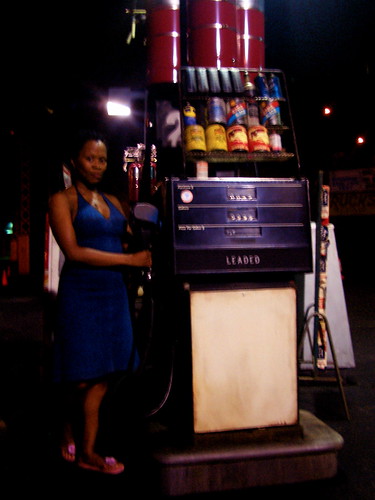
In no time at all, the three of us found a cement block to sit on. As we talked and gazed at the stars, Todd began to wiggle his way off of the block and onto the expanse of rocks that stretched out all the way to the Washington Bridge. Don’t do that, I said as he began to shift and lower himself onto the rocks. Mere seconds later after he scraped his hands, he laughed good-naturedly and said, you told me not to do that, didn’t you. He perched himself on the rocks and the three of us admired the way New Jersey glittered before us and continued to chat about everything and nothing.
That’s when a strange thing happened. Todd began to take off all of his clothes.
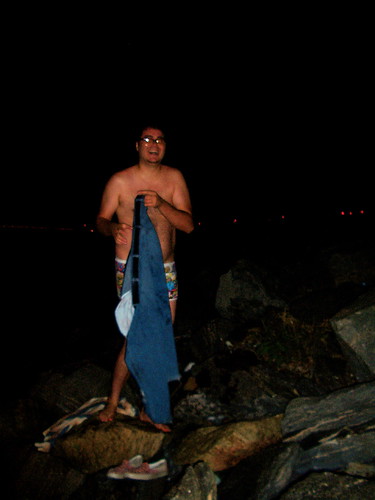
Now what he was doing wasn’t really all that strange to me. I’ve seen people skinny dip before. I’ve certainly done it. But that was my crazy college years in the South, people. That was Austin, Texas – the nation’s capital. They have swimming holes that are designated for people who want to strip and dive in, if they feel so inclined -- clean waters, waters that aren’t polluted and filthy and just flat-out wrong. What’s bizarre is that on our way to this particular spot, we had a conversation about how the city was considering not cleaning up the toxic waste at the bottom of the river that’s been there since way before the Carter administration because stirring it up would make the waters vile, and how they were pretty nasty anyway but cleaner than it was when they started dumping the filth. And there’s a lot of good sediment in there, some 30 years worth. But it’s lying over all the bad gunk, so in the long run how good is it really?
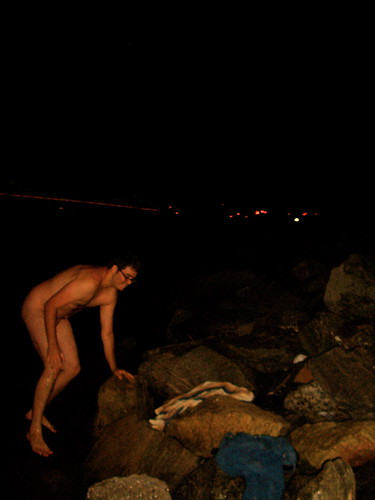
Don’t do that, my friend said as Todd started to get in, because if anything happens to you, I’ll have to jump in and get you. Oh, no you won’t, I said flatly. You’re not getting in that water. He’s grown, that’s his choice.
And off he went.
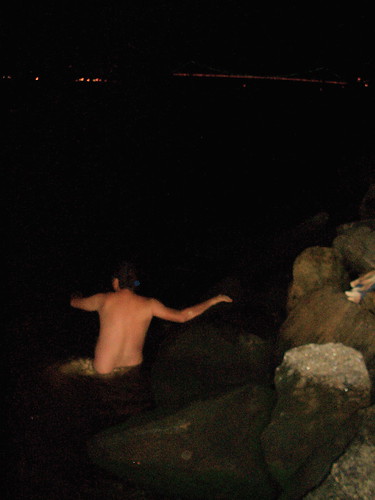
I’m not such a prude that, if the weather was hot enough and if I were with the right group of friends, I wouldn’t take my clothes off and dive in. I have been to nude beaches up here but this – skinny-dipping in the Hudson River! – was different. I have never seen anyone do this up here, probably because I’ve never seen water that’s clean enough (or far away enough from the prying eyes of the public) to really pull it off. I think I was in shock. I wanted him to stop so I pulled out my digitalcamera and started taking pictures. He didn’t like this – “Hey! Don’t take any pictures of my junk!” – but it didn’t deter him. Not in the least. Even when he saw what we were sitting on – the flat end of a gigantic cement pipeline that spewed green filth and goo into the river – he still didn’t climb out.
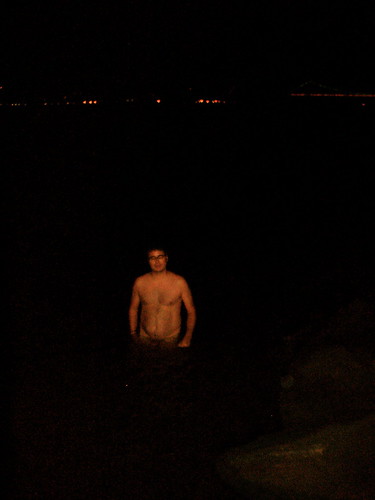
Then again, this is the guy that rode his bike to Iowa in three weeks from New York City and instead of getting a hotel room when he got tired, he slept on the side of the road. (Weren’t you afraid that someone would kill you, I asked. My friend laughed and said, People probably thought that he was the killer. Point taken.) This is the guy that’s been living in the forest in New Mexico in a converted school bus with his girlfriend for the past year or so. (What’d you do for a toilet, I asked over dinner. Well, he began good-naturedly, we had a shovel back in the woods with a roll of toilet paper at the end of it.) This is the guy whose idea of camping with his girlfriend is to get on bikes, ride until they’re both exhausted, then find a Denny’s so they can get some cardboard boxes out back, flatten them and sleep on them. When they got there, his girlfriend was like, so I guess there’s not going to be any marshmallows, huh. She was beyond angry. She was incensed. (After he told this one, I turned to my friend and said, We are sooooo never going camping.)
When I told Todd that sleeping at rest stops was a dangerous thing to do, he raised his eyebrows slightly and asked, really? and he wasn't kidding. After listening to one fearless yarn after another, i realized that he's like the Robert Duvall character in Apocalypse Now, the one that the narrator predicted would leave the war without a scratch on him.
I used to know a lot of guys like Todd when I lived in Austin. I wonder what they're doing now?
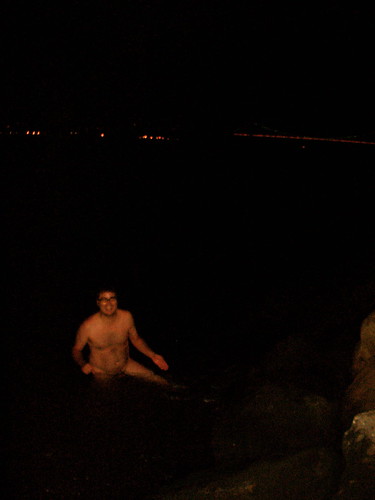
I told him that I was going to blog the photos but he seemed more excited and pleased by the fact that my friend’s mother would probably get to see his Fantastic Four underwear than any subsequent embarrassment he might feel about taking his little midnight swim in delecto flagrante. So here it is.
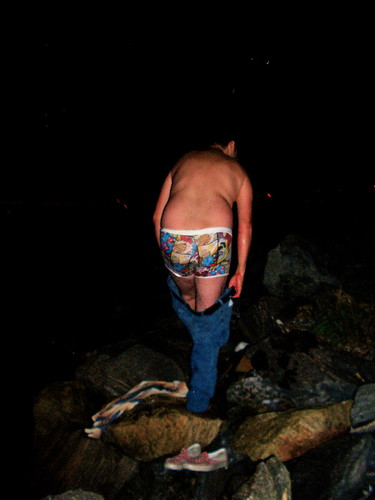
Now that his little playmate is back from the southwest, I have no idea what my friend is going to turn into. Not that he would ever jump into the East River. I just don’t want him to be an accessory after the fact to any of Todd’s nutty shenanigans. On second thought, it’s too late. As of last night, we both are.
Tuesday, August 08, 2006
Why White People Are Afraid
---------------------------------------------------------------------------
by Robert Jensen, AlterNet
It may seem self-indulgent to talk about the fears of white people in a white-supremacist society. After all, what do white people really have to be afraid of in a world structured on white privilege? It may be self-indulgent, but it's critical to understand because these fears are part of what keeps many white people from confronting ourselves and the system.
The first, and perhaps most crucial, fear is that of facing the fact that some of what we white people have is unearned. It's a truism that we don't really make it on our own; we all have plenty of help to achieve whatever we achieve. That means that some of what we have is the product of the work of others, distributed unevenly across society, over which we may have little or no control individually. No matter how hard we work or how smart we are, we all know -- when we are honest with ourselves -- that we did not get where we are by merit alone. And many white people are afraid of that fact.
A second fear is crasser: White people's fear of losing what we have -- literally the fear of losing things we own if at some point the economic, political, and social systems in which we live become more just and equitable. That fear is not completely irrational; if white privilege -- along with the other kinds of privilege many of us have living in the middle class and above in an imperialist country that dominates much of the rest of the world -- were to evaporate, the distribution of resources in the United States and in the world would change, and that would be a good thing. We would have less. That redistribution of wealth would be fairer and more just. But in a world in which people have become used to affluence and material comfort, that possibility can be scary.
A third fear involves a slightly different scenario -- a world in which non-white people might someday gain the kind of power over whites that whites have long monopolized. One hears this constantly in the conversation about immigration, the lingering fear that somehow "they" (meaning not just Mexican-Americans and Latinos more generally, but any non-white immigrants) are going to keep moving to this country and at some point become the majority demographically.
Even though whites likely can maintain a disproportionate share of wealth, those numbers will eventually translate into political, economic, and cultural power. And then what? Many whites fear that the result won't be a system that is more just, but a system in which white people become the minority and could be treated as whites have long treated non-whites. This is perhaps the deepest fear that lives in the heart of whiteness. It is not really a fear of non-white people. It's a fear of the depravity that lives in our own hearts: Are non-white people capable of doing to us the barbaric things we have done to them?
A final fear has probably always haunted white people but has become more powerful since the society has formally rejected overt racism: The fear of being seen, and seen-through, by non-white people. Virtually every white person I know, including white people fighting for racial justice and including myself, carries some level of racism in our minds and hearts and bodies. In our heads, we can pretend to eliminate it, but most of us know it is there. And because we are all supposed to be appropriately anti-racist, we carry that lingering racism with a new kind of fear: What if non-white people look at us and can see it? What if they can see through us? What if they can look past our anti-racist vocabulary and sense that we still don't really know how to treat them as equals? What if they know about us what we don't dare know about ourselves? What if they can see what we can't even voice?
I work in a large university with a stated commitment to racial justice. All of my faculty colleagues, even the most reactionary, have a stated commitment to racial justice. And yet the fear is palpable.
It is a fear I have struggled with, and I remember the first time I ever articulated that fear in public. I was on a panel with several other professors at the University of Texas discussing race and politics in the O.J. Simpson case. Next to me was an African American professor. I was talking about media; he was talking about the culture's treatment of the sexuality of black men. As we talked, I paid attention to what was happening in me as I sat next to him. I felt uneasy. I had no reason to be uncomfortable around him, but I wasn't completely comfortable. During the question-and-answer period -- I don't remember what question sparked my comment -- I turned to him and said something like, "It's important to talk about what really goes on between black and white people in this country. For instance, why am I feeling afraid of you? I know I have no reason to be afraid, but I am. Why is that?"
My reaction wasn't a crude physical fear, not some remnant of being taught that black men are dangerous (though I have had such reactions to black men on the street in certain circumstances). Instead, I think it was that fear of being seen through by non-white people, especially when we are talking about race. In that particular moment, for a white academic on an O.J. panel, my fear was of being exposed as a fraud or some kind of closet racist.
Even if I thought I knew what I was talking about and was being appropriately anti-racist in my analysis, I was afraid that some lingering trace of racism would show through, and that my black colleague would identify it for all in the room to see. After I publicly recognized the fear, I think I started to let go of some of it. Like anything, it's a struggle. I can see ways in which I have made progress. I can see that in many situations I speak more freely and honestly as I let go of the fear. I make mistakes, but as I become less terrified of making mistakes I find that I can trust my instincts more and be more open to critique when my instincts are wrong.
Robert Jensen is a journalism professor at the University of Texas at Austin. He is the author of, most recently, The Heart of Whiteness: Confronting Race, Racism and White Privilege (City Lights Books), from which this essay is excerpted.
© 2006 Independent Media Institute. All rights reserved.
Tuesday, August 01, 2006
size matters
there's no way that anyone would look at me and see any of those things -- although admittedly, sometimes being black and female is enough. i don't really want to get into all of the stereotypes these images resurrect and in some cases, reinforce -- and how those things undermine us socially. we'll have to chat about that some other time. it's too enormous.
-------------------------------------------------------------
An Image Popular in Films Raises Some Eyebrows in Ads

Portrayals of black women in a current Universal Studios ad.
At 200 pounds plus — most of that pure attitude — she is hard to miss.
Her onscreen presence takes on many variations, but she is easily recognizable by a few defining traits. Other than her size, she is almost always black. She typically finds herself in an exchange that is either confrontational or embarrassing. And her best line is often little more than a sassy “Mmmm hmmm.”
This caricature, playing on stereotypes of heavy black women as boisterous and sometimes aggressive, has been showing up for some time in stand-up comedy routines and in movies like “Big Momma’s House’’ and “Diary of a Mad Black Woman.’’ Often, the pieces are produced by directors and writers who are black themselves.
With black creators giving more acceptability to the image, it is now starting to appear more often in television commercials as well. Most recently some variation of this character has appeared in commercials for Dairy Queen, Universal Studios and Captain Morgan rum.
But despite the popularity of such characters among blacks, the use of the image of big black women as the target of so many jokes is troublesome to some marketers and media scholars.
“It is perpetuating a stereotype that black females are strong, aggressive, controlling people,’’ said Tommy E. Whittler, a marketing professor at DePaul University. “I don’t think you want to do that.’’
To be sure, sassy overweight black women appear to represent only a small fraction of the African-American actresses who appear in commercials. Marketers have made strides in recent years toward making advertisements with a more diverse cast of characters.
Blacks regularly appear in commercials selling products as diverse as toothpaste, credit cards and erectile dysfunction medication. Indeed, according to several academic studies, over the last 15 years the number of blacks appearing in commercials has been roughly proportional to their share of the American population, about 14 percent.
“Over the years it’s evolved,’’ said Fay Ferguson, co-chief executive of Burrell Communications, an advertising agency that specializes in marketing toward black consumers. “We’ve come a long way in how we see black women in advertising.’’
Stereotypical portrayals of blacks in commercials have drawn criticism from civil rights groups for decades. Some of the earliest and most iconic examples of blacks in advertising — Rastus the Cream of Wheat chef, Aunt Jemima, Uncle Ben — showed blacks in subservient roles that recalled the days of slavery.
Those images have been toned down over the years (Aunt Jemima’s red bandanna, for example, was replaced with pearl earrings and a lace collar in 1989) and are no longer as overtly stereotypical as they once were. And now there are many examples of blacks presented in middle-class settings and engaged in mainstream activities.
To some, the freer use of overweight black women in comic situations suggests a welcome change that reflects a broader acceptability of blacks in the media. But others find the recurring use of the image a return to a disturbing past.
And some say these images may serve to exacerbate misunderstanding between whites and blacks.
“Not only are we being given images of who we are supposed to be, but others are also formulating their images of us based on that,” said Marilyn Kern Foxworth, an author and marketing expert who studies how blacks are portrayed in advertising. “People have already determined who we are and how we’re going to react in certain situations.”
The heavy black female makes one of her latest appearances in a commercial for the Dairy Queen Blizzard. In the spot, a man boarding an airplane sets his ice cream shake down so he can load his bag into an overhead compartment. As he reaches up, another passenger on the plane starts eating the Blizzard. Seeing this, the first man lets go of his bag so he can reclaim his Blizzard and inadvertently drops his luggage on another passenger’s head.
That unlucky passenger happens to be an overweight black woman who lets out an irritated gasp that reminds all the passengers around her who not to mess with.
Rick Cusato, executive vice president for Grey Worldwide, the firm that wrote the campaign for Dairy Queen, said the script was not written with a black actress in mind.
“We basically cast the funniest person,” he said. “We didn’t specifically cast for a black woman. We said, ‘Wow, she’s really funny.’ And she happened to be black.”
Another new Dairy Queen commercial features a similar character — played by the same actress — working as an airport security screener. When a man tries to walk through a metal detector eating a Dairy Queen burger, her eyes dart disapprovingly downward at him. Then she barks, “Uh, uh. Get on!” directing him to walk through again.
Michael Keller, Dairy Queen’s chief brand officer, said the company considered actors of all sizes and races before making a decision. “We looked at male body builders, really big tall women. We looked at just about everybody we could,” he said. “She projected an image that was everything we wanted it to be. This is just a strong woman being herself.” He added that the company had not received any complaints about the ads being racially insensitive. But to some these images are troubling.
“It’s not an accident that she’s African-American and heavy,” said Howard Buford, founder and chief executive of Prime Access, an advertising agency that creates commercials marketed toward minority audiences. “There’s certainly a long heritage of large African-American women who are kind of sassy and feisty and humorously angry. There’s a sense that this whole value system is O.K. again.”
Large black actresses have had recurring roles in commercials over the years, and often are cast in roles where their aggressiveness is a defining trait. The heavy black spokeswoman for Pine Sol was one of the first to embrace the role. Her aggression was aimed at household dirt, however, not people. In a recent commercial for Captain Morgan rum, a large black woman berates her man for playing dominoes and making her late.
In one recent Twix commercial, a full-figured black woman asks her boyfriend if her pants make her rear end look big. As the camera focuses on her plump backside (exaggerated by the camera for effect), the man stuffs his face with a Twix bar and mumbles an indecipherable answer.
Pleased with his response, the woman walks away. She is not shown being aggressive or loud, but the commercial leaves the impression that if the man had given the wrong answer, she might have erupted.
A series of Universal Studios commercials star a heavy black woman who is accompanying her children on a Jurassic Park ride. Frightened by the ride, she roars and buries the heads of her two young children in her bosom.
Black advertising executives have noticed the stereotype.
“There’s an image out there of black women being boisterous, overbearing, controlling and extremely aggressive in their behavior,” said Carol H. Williams, who runs her own advertising firm in Oakland, Calif., that specializes in marketing toward blacks. “I really don’t know why that stereotype is laughed at.”
Some have trouble with the new commercial images in part because they are being created by white writers.
“There are images of African-Americans created for white people by white people and there are images of African-Americans created for African-Americans,’’ Mr. Buford said. “And there’s a big difference.”
The lack of diversity on Madison Avenue has been a long-standing issue. In fact, the New York City Commission on Human Rights is investigating the hiring practices of advertising agencies in the city and is looking at how they have approached employing blacks.
Jannette L. Dates, dean of the communications school at Howard University, said that while whites and blacks could watch the same portrayal of a large black woman on television and laugh, they are laughing for different reasons.
Some whites, Ms. Dates said, may laugh thinking, “Wow, she’s so ridiculous. My people aren’t like that.” She added: “They wouldn’t consciously feel that way. But there is something going on subconsciously because that’s what advertising is all about. They’re trying to tap into some feeling, some emotion, some psychological hang-up.”
Blacks, meanwhile, might laugh because they can identify with the character, Ms. Dates said. “It’s for both the people who want to snicker and say, ‘See, that’s how they are.’ And for people to say, ‘There’s one of us.’ ”
Orlando Patterson, a sociology professor at Harvard, amplified that point. “To the black audience, this may be, ‘You do your thing, sister,’ ” Professor Patterson said. “The white audience is laughing with her. Then they go back to reality, and they laugh at her.”
But Liz Gumbinner, a creative director at David and Goliath, the agency that developed the Universal campaign, said the broad appeal of the commercials was proof they were not insensitively playing on racial stereotypes.
Noting that a black woman in a recent David and Goliath focus group spoke up about how much she liked the Universal ads, Ms. Gumbinner said: “I wonder if sometimes when you have somebody that is less conventional, they become the most memorable. We use a lot of bald men, and it’s not like we have it out for bald men.”
Ms. Gumbinner and Mr. Cusato of Grey Advertising, however, said no black writers were involved in either of their campaigns.
As is typically the case with racial stereotypes, who is laughing and why is complex and potentially inflammatory. Black actors and comedians have profited handsomely from creating bumptious female characters on TV and in movies, raising the issue of whether they, too, are perpetuating the stereotypes that many find offensive.
Tyler Perry, the filmmaker and actor, created a series of plays and movies, including the huge hit “Diary of a Mad Black Woman,” in which the main character Mable (Madea) Simmons is a no-nonsense overweight matriarch. Mo’Nique, a full-figured comedian, has built a routine on being outlandish, brash and, at times, downright crude.
Mr. Buford, of Prime Access, said part of what makes the comedy of Mr. Perry and Mo’Nique acceptable is that it is written from a personal experience common to many blacks.
“Authenticity makes a lot of difference,” he said. “It’s authenticity born of having lived that life versus having been cast in that role.”


